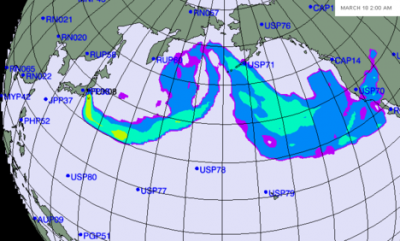Is Fukushima Radiation Decimating Wildlife in the Western Portion of North America?
Seals, Sea Lions, Polar Bears, Bald Eagles, Sea Stars, Turtles, King and Sockeye Salmon, Herring, Anchovies and Sardines All Suffering Mysterious Diseases

We’ve previous documented that seals, sea lions, polar bears, sea stars, turtles, sockeye salmon, herring, anchovies and sardines on the West Coast of North America are all suffering mysterious diseases … which are killing many.
We’ve asked whether this is related to massive releases of radiation from Fukushima. Update.
Sadly, we can now add other wildlife to the list.
EneNews reports:
Los Angeles Times, Dec. 29, 2013: Bald eagles are dying in Utah — 20 in the past few weeks alone — and nobody can figure out why. […] Many suffered from seizures, head tremors and paralysis […] Many of the eagles were brought to the mammoth Wildlife Rehabilitation Center of Northern Utah […] Within 48 hours, most were dead. […] State wildlife specialists are baffled. For weeks, officials have sent birds for necropsies […] At first, the agency’s disease scientists guessed the illness could be encephalitis, which is caused by the West Nile virus, but later ruled out that possibility. […] Officials suggest the die-off is possibly connected to the deaths of thousands of eared grebes that began in Utah in November. […] Officials still don’t know why the shore birds became sick. […] Officials at the Wildlife Rehabilitation Center have their own theories. Some point to radiation from Japan after the 2011 meltdown at the Fukushima Daiichi nuclear power plant. […] A call from Idaho shed new light: A wildlife official said bald eagles there were also getting sick, suggesting the birds were arriving in Utah already in bad health.
Buz Marthaler, Wildlife Rehabilitation Center of Northern Utah co-founder: “It’s just hard to have your national bird in your arms, going through seizures in a way it can’t control — when you can see it’s pain but don’t know what’s happening to it. As a human being, you just have problems with that. And when you lose one, it just grabs your heart. […] In an average year, we might get one or two, but we’ve received nine so far, and five of those have died. The other four are still in our care. […] We aren’t ruling out anything.”
***
Washington Post, Dec. 30, 2013: […] “This is really concerning to us,” says [Leslie McFarlane, the wildlife disease program coordinator for the state’s Division of Wildlife Resources]. She has been program coordinator for 10 years and describes the recent deaths as “very unusual.” […] The symptoms noted in the recent spate of deaths—and the broad geographical area in which they have cropped up—are what has officials concerned.
In a second article, EneNews notes:
Juneau Empire, Dec. 29, 2013: […] the king [chinook] salmon — has fallen from its throne. […] Alaska has seen unprecedented declines in recent years […] scientists like Joe Orsi and Jim Murphy, both fisheries research biologists with the National Oceanic and Atmospheric Administration, are digging deeper into […] the cause of the startling downward trend. […] When asked about the potential impact Fukushima may be having on king salmon stocks in the Gulf of Alaska and elsewhere in the state, Orsi would not comment. “I’ve been told to refer you to the (Environmental Protection Agency),” he said, “Because I’m not an expert on the topic.” Calls and emails to the EPA were not returned in time and digging on the federal agency’s site revealed no current information on radiation from the Fukushima disaster. The last posted monitoring results occurred in June of 2011.
Unfortunately, the American and Japanese governments are doing everything they can to cover up the severity of the Fukushima disaster. Indeed, anytime government or big corporations screw up, the government works to cover it up … instead of actually fixing the problem. And see this.
EneNews continues:
Bellingham Herald, Dec. 5, 2013: “[…] we see from test fisheries that the Chinook numbers returning to the Fraser River system were at a record low,” explained Ken Balcomb, executive director and principal investigator for The Center for Research and a science advisor to the whale watch association. […] [An] alarming decrease of an important identified food resource […]
Islander Sound, Dec. 25, 2013: [A] dismal return of Chinook salmon to the Fraser River.
Salmon Fishing in British Columbia, Canada: There are two major salmon runs of Chinook that are targeted by anglers; the Fraser river [and] Harrison River.
December 2013: Previously unpublished map from gov’t scientists shows Fukushima plume already at Alaska coast (PHOTO)

